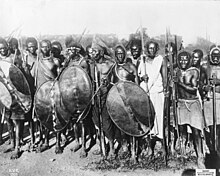Nyamwezi
Nyamwezi is the collective name for a number of Bantu-speaking groups in central Tanzania who share a similar language and cultural background, but never existed as a common social group. The term originated from the contact of the residents of western central Tanzania with Swahili traders and travelers in the 19th century. These people in the country referred to as Nyamwezi, which means "people from the moon".
History until 1800

Information about the early history of the Nyamwezi is vague and uncertain. Oral records indicate that they settled what is now Unyamwezi in the central highlands of Tanzania around 1600. They probably lived in the barren area between Lake Victoria and Lake Rukwas , mainly as fishermen, farmers and cattle herders. They formed small, politically independent tribal principalities, some of which grew and strengthened, others were only short-lived. At the beginning of the 19th century, the Nyamwezi were famous for their large, wealthy households with many slaves, as well as for their impressive herds of cattle, which they had looked after by professional cattle breeders, Tutsi , in client relationships.
Very early on, they must have acted as intermediaries for trade between Central Africa, especially the Katanga region , and the coast. The main trade was in salt , copper , ivory and slaves . The first Nyamwezi caravan reached the coast before 1800, and among other goods they also carried some tusks with them.
The century of the caravan trade
In the early 19th century, a number of powerful societies existed in the region, such as Unyamyembe and Urambo, which played a central role in the East African caravan trade. When, due to the influence of the Sultan of Oman , who had moved his seat to the island of Zanzibar , the demand for slaves for the clove plantations of Zanzibar and ivory as an export product soared, this led to an expansion of the caravan trade in East Africa. The Swahili-Arab caravans tied in with the African trade networks inland, including that of the Nyamwezi. They founded trading posts in the country, such as Tabora in Unyamwezi, and tried, often successfully, to influence social and political developments in societies.
The Nyamwezi played a decisive role in the caravan trade. On the one hand, they supplied the caravans of the coast with goods such as slaves and ivory, but on the other hand they also equipped their own caravans and traveled to the coast with the goods. Working as a porter and traveling with a caravan to the East African coast became a test of manliness for the Nyamwezi, it contributed to prosperity and helped to social prestige.
Firearms , which increasingly came inland through lively contact with coastal traders, changed the societies in Unyamwezi. Ntemi (chiefs) like Mirambo rose quickly through the acquisition of firearms. They set up standing armies (see Rugaruga ) and broke through the previous social order, which was based on the principle of reciprocity and seniority .
